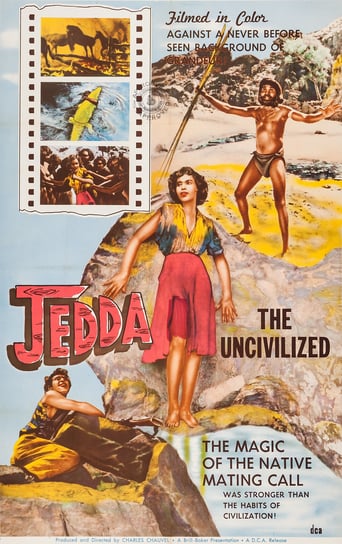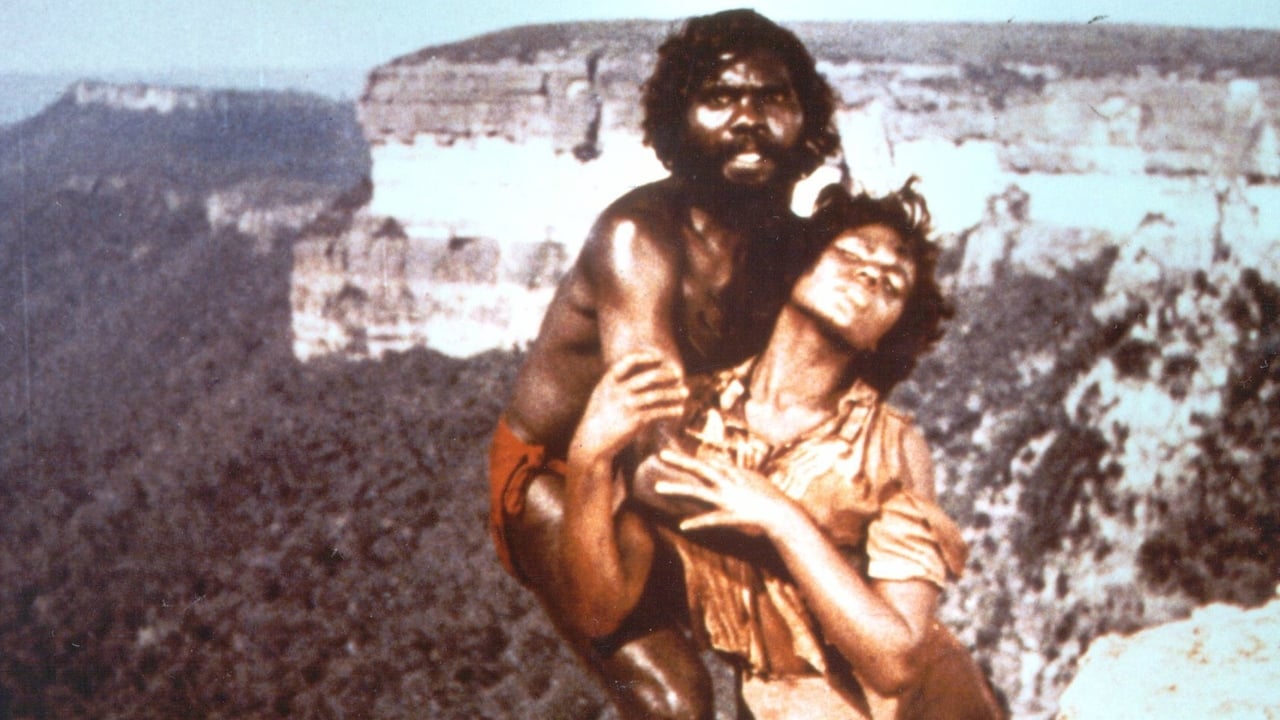JohnHowardReid
Copyright 1956 by Charles Chauvel Productions. U.S. release through Distributors Corporation of America: 12 June 1956. New York opening at the 46th Street Embassy: 27 February 1957. U.K. release through Independent/British Lion: 13 August 1956. Australian release through Columbia: 5 May 1955. Sydney opening at the Lyceum: 5 May 1955. 9,046 feet. 100 minutes. Cut to 88 minutes in the U.S.A, 73 minutes in the U.K.
U.S. release title: Jedda the Uncivilized. NOTES: Charles Chauvel's final feature. After completing Jedda, he shot 13 eps for the television series Australian Walkabout. He died in 1959. "Jedda" was Number 24 at Australian ticket windows for 1955.COMMENT: Surprising to notice Jedda had a "General Exhibition" certificate on original release. It certainly wouldn't get such an all clear today. Obviously filmed without the co-operation of the Royal Society for the Prevention of Cruelty to Animals, the film graphically shows animals being shot and killed. Not as emotionally disturbing, but still irritating are crude technical elements such as obvious post-synching (including a ridiculously phony voice for the narrator) and a disappointingly Mickey Mouse music score from Australia's famed Isador Goodman. Director Charles Chauvel manages to get some breathtaking scenery in front of the camera, but his skills with the players are much less impressive. Tudawali comes across best. Betty Suttor and George Simpson-Lyttle are especially bad, leaving the viewer to wonder how such abominably hammy performances could have survived a screening of the initial rushes in the cutting-room.
The story is so drawn out that the chase is uninvolving. It's the location photography that really impresses, the great red canyons of the Northern Territory that Kayser has so finely captured in a color system that obviously favors reds by day and purples by night. Eric Porter is credited for "additional photography", though actually his contribution is mainly limited to the animation of the jedda birds before "The End" title - and very obvious animation it is too!
tomsview
There are things in this old movie to give one pause, especially Aussies.On one hand we have a historically significant film that despite flaws is compelling enough in its own way, while on the other the situation that has bedevilled relations between indigenous and white Australians for the last 230 years is displayed without a hint of embarrassment.Filmmakers Charles and Elsa Chauvel put forward two opposing points of view in "Jedda": one suggesting that indigenous Australians should be assimilated into the wider white society and the other claiming instincts instilled in a people during 50,000 years of isolation could not be suppressed in a few generations. However what really hits you in "Jedda" is the patronising and condescending way the whites treat the blacks - forget about equal pay and land rights.When an Aboriginal mother dies, her baby is taken in by Sarah McCann, the white wife of a cattle station owner. She had just lost her own baby, and although it's not a classic example of 'The Stolen Generation', it's not far off. She calls the little girl "Jedda" and raises her as her own.But as "Jedda" grows she is drawn spiritually to her own people despite a relationship with Joe, a half Aboriginal, half Afghan stockman. Casting Joe as a white man or half white may not have travelled well back in '55; apartheid didn't officially exist in Australia, but boundaries were easy to find. Paul Reynall, a white actor in blackface, played Joe.A renegade Aboriginal, Marbuck (Robert Tudawali), enters the scene and sensing Jedda's conflict, takes her forcibly on a journey through dangerous country. He is pursued by Joe, but when he is rejected by his own tribe, tragedy ensues.The film seems rough around the edges compared with films from Hollywood and Britain at the time. The most fascinating aspect is the two unknown Aboriginal actors from remote areas who were virtually thrust in front of the camera - Rosalie Kunoth Monks as Jedda and Robert Tudawali as Marbuck. Rosalie Kunoth Monks who was aged about 15 didn't really know what was happening. Although the Chauvels were decent people who treated her well, years later when asked if she was tempted to go on with an acting career, she replied, "No siree!" She became a nun and then a high-profile spokesperson for her people.Tudawali on the other hand caught the acting bug, but his life ran off the rails. In 1988, his story was depicted in an uncompromising film, "Tudawali" starring Ernie Dingo. It highlighted problems the Chauvels didn't.Black and white relations in Oz have had a considerable airing in films since "Jedda", including films made by indigenous Australians, but the whole thing is definitely still a work in progress.
ptb-8
JEDDA was a major cinema release in 1956 in Australia and has long been regarded as a cinema classic in this country. For international audiences now that RABBIT PROOF FENCE has found success in most countries, it is well worth seeing JEDDA as a 1956 counterpart. Filmed in Gevacolour (not Technicolor) it was the first film made in any color here. Heralded at the time for its daring depiction of the real and confronting tribal practices of ancient aboriginal Australia JEDDA still is able today to enthrall a (slightly forgiving) audience and still make you appalled at the very racist White Australia policy in force from the Government of the day. Sadly some of the acting is dated, especially in the beginning, but once Jedda is a woman and the tribal lure starts, it really becomes fascinating. The use of color in the outback expanses and the extraordinary presence of the two genuine black Aboriginal main actors allows JEDDA to become a major statement about the well-meant but misguided practices of Government policies and how they are (still) totally unsuited to such a spiritual people. The sequence where Marbuck 'sings' to Jedda, seducing her in a hypnotic sexual trap is quite startling and un nerving. The climax of the film rivals NORTH BY NORTHWEST for spectacular mountaintop drama. JEDDA would be available from SCREENSOUND Australia the Canberra Archive and interested persons could buy it on-line. It is exceptionally interesting. A near counterpart from the USA is the 1947 Indian/Chinese drama BLACK GOLD, made by Allied Artists and Directed by noir expert Phil Karlson.
mandy-1
In 1955 when I was 14 years old, my mother and I emigrated to Australia. I went to 8th grade just outside Sydney -- Cremorne Girls High School. The opening of "Jedda" the first Australian color feature film was a very big deal there. In fact the opening of any film was a pretty big deal there, entailing reservations and dressing up.In "Jedda," the title character, an aboriginal girl is brought up by a white family that adopts her. As a young woman, she is mysteriously drawn to go "Walkabout" as people of her tribe have for hundreds of years.It must have been a good year for films. "Rock Around the Clock" heralded the dawn of rock 'n roll and "Black Board Jungle" launched the career of Sidney Poitier in a tale of urban classroom violence. "Rebel Without a Cause" came out in 1955 too. I can't remember what films I saw in any particular year before or since more vividly than these. Among those classics, the now unknown "Jedda" stands out with lasting images of a beautiful aboriginal woman, stunning countryside and the residue of an emotional wallop that keeps me thinking and wishing I could see it again over 45 years later.



 AD
AD


